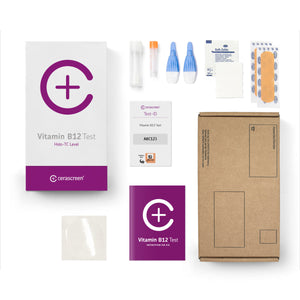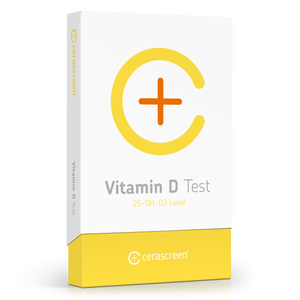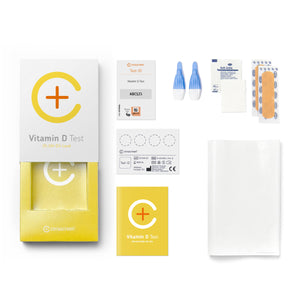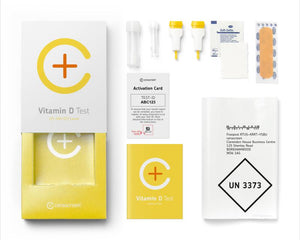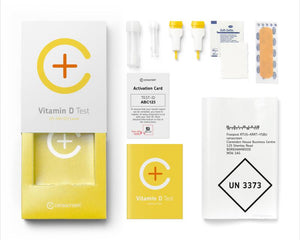Vitamin Deficiency Tests
Choose categoryselftests
health-coaching
all
/blogs/health-portal
/pages/about-us
Why perform a vitamin deficiency test?
Vitamins are substances that the body needs for normal cell function, growth, development and overall health. They are needed for the body to be able to function properly. If our vitamin intake is too low, the body can no longer carry out certain functions as it should.
Depending on the vitamin, a vitamin deficiency can trigger different health problems. In the western world, vitamin B12 deficiency and vitamin D deficiency are particularly common. Find out if your vitamin B12 and vitamin D levels are within a healthy range with the home vitamin deficiency tests from cerascreen®.
What are the symptoms of a vitamin deficiency?
We acquire most of our vitamins by consuming food. The exception here is vitamin D. The sunshine vitamin can only be produced in our body when the skin is exposed to sufficient sunlight. Today, however, we spend most of our time indoors, meaning that our skin is barely exposed to the sun.
As a result, more and more people are developing vitamin D deficiency. Typical symptoms of such a deficiency are fatigue, tiredness, headache and muscle weakness. A severe deficiency means that our bones become weaker over time, increasing the risk of bone diseases such as osteoporosis.
Vitamin B12 deficiency is also widespread – especially, among vegetarians and vegans, since the vitamin is found almost exclusively in animal foods. Symptoms of this vitamin deficiency include lower physical performance and concentration. It can also promote depression and, in severe cases, even lead to anaemia and disorders of the nervous system.
Vitamin deficiency test kits from cerascreen®
Do you belong to one of the risk groups and suspect a deficiency, or are you simply interested in how your vitamin levels are looking? Using the cerascreen® Vitamin Test and the Vitamin B12 Test, you can measure these vitamin levels with a vitamin deficiency test kit in the comfort of your home. Our vitamin deficiency tests allow you to take a small blood sample and then send it in to our specialist partner laboratory.
You will then receive a results report within a few days, which will inform you of your vitamin levels and give you tips on how to get your vitamin levels back on track if there is a deficiency.
How can I boost my vitamin levels with supplements?
Once you have confirmed a vitamin deficiency – through taking a home vitamin deficiency test, for example – there are certain measures you should take to optimise your vitamin levels again. If you suffer from a vitamin deficiency, vitamin D and vitamin B12 in particular are very difficult to replenish through sunbathing and your diet alone. In such cases, dietary vitamin supplements may be useful.
Vitamin B12 supplements, for example, can be taken in the form of tablets, capsules or drops. It is the active forms of vitamin B12, for example methylcobalamin, that are best utilised by the body. You can prevent a deficiency by taking 1,000 microgrammes per day, but for treating severe deficiencies, high-dose injections may be used that will be administered monthly by your doctor.
With vitamin D supplements, a dose of 2,000 International Units (IU) is enough to maintain healthy vitamin D levels and prevent a deficiency. If you already have a vitamin D deficiency, you can also take a higher dose for a while to replenish your vitamin reserves. The body can process supplements, in which cholecalciferol (vitamin D3) – that is, the active form of vitamin D – is dissolved in oil.







